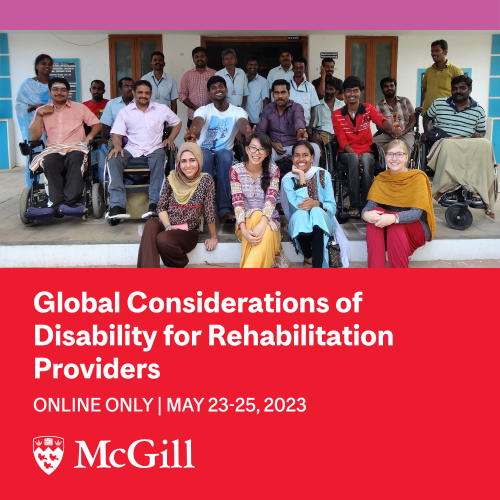
View courses by topic or week
 Global Considerations of Disability for Rehabilitation Providers
Global Considerations of Disability for Rehabilitation ProvidersThis course will not be offered in 2024.
This course will help rehabilitation providers engage with disability in a complex and globalizing world. Through interactive and community-building activities, participants will expand their understandings of disability and the contributions that rehabilitation providers can make to improve the situation of persons with disabilities worldwide.



Shaun Cleaver, PhD
Faculty Lecturer, School of Physical and Occupational Therapy, McGill University, Montreal, Canada
Sidhiprada Mohapatra, MPT
Assistant Professor, Department of Physiotherapy, Manipal College of Health Professions, Manipal Academy of Higher Education
Faculty are still being confirmed and there may be changes to the above list.
Rehabilitation providers—from rehabilitation professions to individuals supporting community-based programs—are united by the drive for enhanced function, better health, and improved quality of life. With rehabilitation’s focus on function, its activities are often targeted towards those who have the greatest problems functioning: “the disabled,” or alternatively, “persons with disabilities.” The numbers of persons with disabilities worldwide are large and growing, with over one billion people currently estimated to live with some form of disability (World Health Organization). Given that populations internationally are aging, that more people are living with chronic conditions, and that notions of disability are becoming more comprehensive and better known, it is foreseeable that the estimated number of persons with disabilities will continue to grow.
Demographic prominence alone has unfortunately not transformed the experience of living with a disability: persons with disabilities continue to face frequent societal exclusion because of barriers to participation in education, employment, healthcare, and social activities. Rehabilitation providers worldwide face paradoxical positions relative to disability: whereas rehabilitation can offer essential support and care to persons with disabilities, rehabilitation can also perpetuate ableism, the oppression of persons with disabilities. Examples of ableism perpetuated by rehabilitation include the reinforcement of discourses of normality and the concentration of power and resources into institutions and professional activities at the expense of initiatives led by the disabled.
Given the complexities of rehabilitation in globalizing contexts, this summer institute course aims to equip rehabilitation providers to engage proactively with disability. Course content will expand the perspectives of rehabilitation providers with respect to understanding disability as a societal and human rights concern. Course delivery will include interactive and community-building activities to encourage collective learning and independent development.
By the end of this course, participants will be able to:
The targeted audience for the summer school will include rehabilitation professionals from the disciplines of:
Maximum 50 participants.